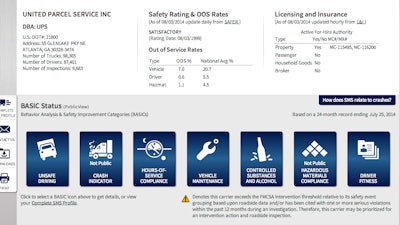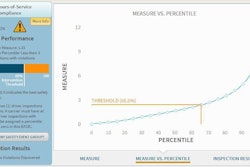
A coalition of transportation trade groups, in a letter to Transportation Secretary Anthony Foxx, have urged that the scores produced by the Federal Motor Carrier Safety Administration’s Compliance, Safety, Accountability fleet monitoring system be removed from the agency’s website. The letter points to recent government research that found the scores unreliable.
“Given the results of this research we urge you to direct FMCSA to remove motor property and passenger carriers’ CSA Safety Measurement System scores from public view,” the letter says. “Recognizing the merits of raising public awareness of fleets’ true safety performance in the future, we also call on you to direct FMCSA to make CSA improvements a high priority.”
The letter cites research by the Government Accountability Office (see the slides, above) that found that, with respect to most motor carriers, “FMCSA lacks sufficient safety performance information to reliably compare them with other carriers. The report went on to say that the lack of data “creates the likelihood that many SMS scores do not represent an accurate or precise safety assessment for a carrier.”
“Given the many identified data sufficiency and reliability issues outlined by the Government Accountability Office, we urge you to direct FMCSA to remove carriers’ SMS scores from public view,” the letter concludes. “Doing so will not only spare motor carriers harm from erroneous scores, but will also reduce the possibility that the marketplace will drive business to potentially risky carriers that are erroneously being painted as more safe.”
Shortly after the GAO report became public, FMCSA released its own analysis of CSA, concluding the system does work to identify carriers who pose the greatest crash risk. A DOT audit, however, determined that FMCSA must be more careful about its collection, management and analysis of data, or the federal trucking regulator “will be hindered in its ability to effectively implement CSA nationwide and address the key concerns of industry stakeholders.”
Both American Trucking Associations and the Owner-Operator Independent Drivers Association signed the letter.
“Having accurate, relevant and up-to-date information is paramount to knowing the true condition of a carrier and making any conclusions about its safety, good or bad. Unfortunately, CSA does not meet that standard,” says Todd Spencer, OOIDA executive vice-president. “CSA was developed as a tool for enforcement agencies, and nothing in our request changes their access to information about carriers.”
In addition to ATA and OOIDA, the letter was signed by representatives of the American Bus Association, American Moving and Storage Association, the National Private Truck Council, National School Transportation Association, the National Tank Truck Carriers, the Specialized Carriers and Rigging Association, Truckload Carriers Association and United Motorcoach Association.
FMCSA spokesperson Marissa Padilla says the SMS has been “a game changer” in improving safety by making company violations and safety records publicly available to consumers, law enforcement and other businesses.
“The GAO’s one-size-fits-all approach to analyzing inspection data would require the agency to triple the number of inspections we finance each year, to exceed more than 10 million nationwide, which is simply unrealistic under our budget, and would fail to assess the behavior of more than 90 percent of the entire motor carrier population,” Padilla says. “Our research shows that by focusing on the most at-risk carriers, we effectively remove the companies most often involved in crashes from the road. We continue to work with all partners to ensure an efficient, transparent system to provide safer transportation for everyone on the road.”
CCJ’s ongoing CSA’s Data Trail series of reports examines news and data related to the CSA program and various enforcement issues. Access updated state data on inspection intensity, violation priorities and more via the maps and downloads available via CCJdigital.com/csa.










